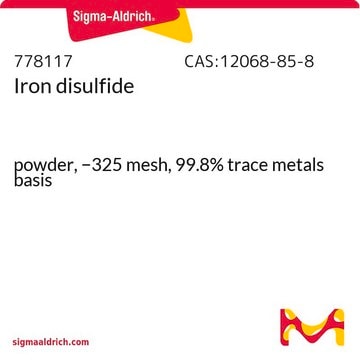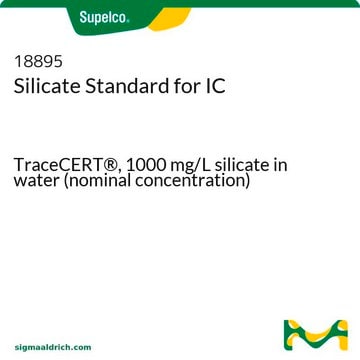268704
Iron(II) sulfide
technical grade
Synonym(s):
Ferrous sulfide
Sign Into View Organizational & Contract Pricing
All Photos(2)
About This Item
Empirical Formula (Hill Notation):
FeS
CAS Number:
Molecular Weight:
87.91
EC Number:
MDL number:
UNSPSC Code:
12352302
PubChem Substance ID:
NACRES:
NA.55
Recommended Products
grade
technical grade
form
powder or chunks
concentration
60.0-72.0% Fe (titration)
density
4.84 g/mL at 25 °C (lit.)
SMILES string
S=[Fe]
InChI
1S/Fe.S
InChI key
MBMLMWLHJBBADN-UHFFFAOYSA-N
Looking for similar products? Visit Product Comparison Guide
Features and Benefits
Non-stoichiometric, inhomogeneous product
Storage Class Code
11 - Combustible Solids
WGK
WGK 3
Flash Point(F)
Not applicable
Flash Point(C)
Not applicable
Certificates of Analysis (COA)
Search for Certificates of Analysis (COA) by entering the products Lot/Batch Number. Lot and Batch Numbers can be found on a product’s label following the words ‘Lot’ or ‘Batch’.
Already Own This Product?
Find documentation for the products that you have recently purchased in the Document Library.
Customers Also Viewed
N Finck et al.
Environmental science & technology, 46(18), 10004-10011 (2012-08-21)
The isotope (79)Se may be of great concern with regard to the safe disposal of nuclear wastes in deep geological repositories due to its long half-life and potential mobility in the geosphere. The Se mobility is controlled by the oxidation
Amit Kumar Dutta et al.
ACS applied materials & interfaces, 4(4), 1919-1927 (2012-03-28)
Nanocrystalline FeS and FeSe compounds were prepared by solvothermal decomposition of a precursor complex [Fe(3)(μ(3)-O)(μ(2)-O(2)CCH(2)Cl)(6)(H(2)O)(3)]NO(3)·H(2)O in the presence of thiourea and sodium selenite, respectively. The as-obtained products were characterized by X-ray diffraction analysis (XRD), field emission scanning electron microscopy (FESEM)
Wei Wang et al.
Astrobiology, 11(5), 471-476 (2011-06-29)
The iron-sulfur world (ISW) theory is an intriguing prediction regarding the origin of life on early Earth. It hypothesizes that life arose as a geochemical process from inorganic starting materials on the surface of sulfide minerals in the vicinity of
Andrew D Henderson et al.
Water research, 47(3), 1267-1276 (2012-12-19)
Iron sulfide (FeS) has been extensively assessed as a reactive medium to remove both metals and halogenated organics from groundwater. However, to address its suitability as a material for permeable reactive barriers (PRBs), its propensity for solids and gas production
The structural plasticity of the proximal [4Fe3S] cluster is responsible for the O2 tolerance of membrane-bound [NiFe] hydrogenases.
Jean-Marie Mouesca et al.
Angewandte Chemie (International ed. in English), 52(7), 2002-2006 (2013-01-09)
Our team of scientists has experience in all areas of research including Life Science, Material Science, Chemical Synthesis, Chromatography, Analytical and many others.
Contact Technical Service














